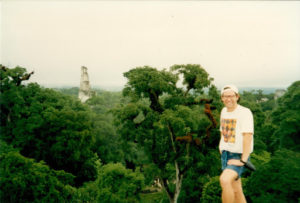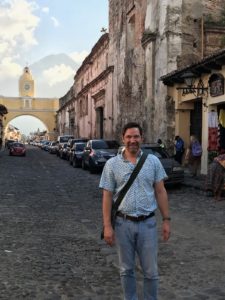
Search
I recently attended the Central America and Caribbean edition of the Latin American Impact Investors Forum (FLII) in Antigua, Guatemala. It was a great event focused on impact investing in Latin America and my first time in Antigua since 1994 when I traveled there to learn Spanish.

Image: Brooke Latham opens the FLII Central America & Caribbean conference in Antigua, Guatemala. Source: Brent Chism
Some things had changed a lot since 1996 — and in Guatemala’s case, mostly for the better, with the end of the civil war, a lot of infrastructure development and mass access to mobile communications.

Image: Tikal, Guatemala 1994. Source: Brent Chism
Other things, like the famous Arco de Santa Catalina, fortunately had not changed at all.

Image: Arco de Santa Catalina, Antigua, Guatemala 2018. Source: Brent Chism
I left the conference impressed with the progress made on impact investing in Latin America and – more specifically – the investment in and resources available to social enterprises in Central America. The region seems poised for growth in entrepreneurship and organizations making significant social impact. Here are four insights I took away from the conference about how technology is enabling this growth.
The Guatemala City-Antigua region has become a hub for technology entrepreneurship
Over the past 15-20 years, social entrepreneurship centers emerged in Nairobi, Mexico City, Silicon Valley, Manilla, London and Accra. I was surprised how many of those elements have already coalesced in the Guatemala City – Antigua region, as part of the larger focus on impact investing in Latin America.
The Impact Hub Antigua provides physical space and a place to network. Entrepreneurship development organizations like the Alterna Center for Social Innovation and Entrepreneurship provide training and support programs. Organizations involved in impact investing in Latin America, like Pomona Impact, are working with local entrepreneurs in an AgTech accelerator program. Commercially oriented software development companies like Torrent Consulting, which built an Antigua hub of Salesforce developers to serve US companies, are recruiting and training a growing population of Guatemalteco coders.
Combine this impact investing in Latin America with all of these local technology enablers, a beautiful country, welcoming people and lots of opportunity for positive change and I can see this area emerging as a new part of a three-way axis between Mexico City and Medellín.
Being a data nerd is a leading indicator of social enterprise success
In his keynote address to the conference, Nicholas Colloff, executive director of Argidius Foundation, shared insights on what leads to success for social enterprises, in any part of the world.
“Being nerdy helps,” Colloff said. “Having Data and knowing what to do with it leads to success.” This speaks to one of the most important reasons to use a CRM system: making it easier to collect, analyze and make real-time business decisions off of data describing the reality of your operations in the field.
The panel discussion in which I participated, “The Power of Technology to Drive Social Change,” agreed with this assessment, but noted that a few, seemingly small details can make all the difference between a useful CRM and a failed project.
And often, those details are not immediately obvious — you only find them through “getting out of the building,” as startup thought leader Steve Blank says. For example, Honey Care, a social enterprise promoting sustainable family beekeeping, wanted to equip it’s beekeepers with mobile tools to track the production of honey in Kenya. After developing and testing a TaroWorks data collection form for this job in their Nairobi office, they found out in the field that the beekeepers couldn’t use the mobile devices without taking off their gloves. Ouch! (To address the problem, Honey Care bought devices that worked with styluses that the beekeepers could use with their gloves on.)

Image: A beekeeper takes his gloves off to use TaroWorks. Source: Honey Care Africa
All four panelists agreed that social enterprises and nonprofits working in the region should first evaluate whether a proposed CRM system works in offline environments, enables two-way communication and data exchange and can be customized for the organization’s business processes and needs.
(For more suggestions on how to choose tools for your field staff, you can read a recent blog post: “Field Service Mobile App vs. Data Collection Tool” by Elaine Chang, TaroWorks’ Director of Market Development and Customer Success.)
One reason CRMs need to work offline: expensive mobile data plans.
During the technology panel, one audience member asked what can be done about the high cost of mobile data plans that limit use of mobile devices in remote areas. Even when data networks reach remote communities in Guatemala, she said, the cost of data plans charged by the duopoly make them unaffordable for most people.
The cost of data plans can differ quite a bit across countries in a region. For example, data prices are much lower in Tanzania, where three mobile network operators fight for market share, than in Kenya, an East African neighbor where Safaricom dominates.
Technology providers can help with this at the margins. For example, TaroWorks lets mobile device users work offline and then choose when to synchronize data because in the past automatic synchronization drove up users’ data costs.
But as Colloff pointed out in his keynote, ultimately industry competition issues fall into the bucket of things that make governments “necessary actors to make the ecosystem work.”
Local investors may be the future of impact investing in Central America.
In a plenary panel on “Re-imagining the Region”: Unlocking the Potential for Global Impact”, Bert van der Vaart, co-founder and CEO of SEAF, said he sees the future in young people educated in the US and Canada returning to Central America to help run family businesses.
Since “good (investment) returns often require local entrepreneurs,” Van der Vaart said, “these returnees could be a big force for development both as entrepreneurs and potential investors in local firms.”
On the same panel, Colloff pointed out that the attitude of larger companies can either foster or stifle local startup development. For example, the different mindsets between Hewlett Packard and Texas Instruments in the 1960s and 70s lead to very different ecosystem results.
Both regions in which these companies were located had similar resources in terms of prominent research universities and growing housing supply. But when employees left Texas Instruments to start companies, Colloff said, TI tried to prevent competition by “suffocating” these startups. This created an ecosystem centered on TI. By contrast, HP encouraged and supported employees to start new technology companies. This approach created the Silicon Valley ecosystem which ultimately grew much larger.
This reminded me of some conversations I had with small and medium sized Tanzanian businesses about funding for their businesses. Many of those businesses regarded local, wealthy investors with distrust. “They just want to come in and steal your business,” one CEO told me. “You can’t trust them.”
It would be so much more empowering for those knowledgeable funders focused on impact investing in Latin America to lead the development of social enterprises in their region and build on the growth already occurring in the Guatemala City – Antigua area. I’m crossing my fingers that when I visit the region 20 years from now, I will be even more reminded of Silicon Valley than I was during the FLII conference.
POST TOPICS
Sign up to receive emails with TaroWorks news, industry trends and best practices.
TaroWorks, a Grameen Foundation company.
Site by V+V